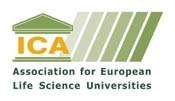Agrobiology
Chair: Prof. Dr. Martin Gerzabek, BOKU Vienna, Austria
Co-Chairs: Prof. Dr. Peter Bielik, SUA Nitra, Slovakia
Twenty-eight abstracts were received for the Agrobiology session of which 15 applied for oral presentations and 13 for posters. Based on the abstract evaluation and final selection by the CASEE Board, Session I consisted of 10 oral and 12 (of which 3 did not show up) poster presentations.
The first authors of the contributions were from institutions from Austria (2 oral + 0 poster), Croatia (1 oral + 0 poster), Hungary (1 oral + 0 poster), Romania (6 oral + 4 poster), Slovakia (0 oral + 7 poster), Slovenia (0 oral + 1 poster).
During the three parts of Session I the number of participants in the auditorium varied between about 10 and 25, providing the opportunity for lively in-depth discussion of the presented themes.
The topics of the talks ranged from overviews on GIS-based modeling of soil resources and productivity (yield and diet gap assessments) in the whole Danube region (introductory talk by L. Rittler) to detailed studies of the interactions between soil management such as fertilization and phytosanitary treatment in pear nurseries (B. Bordeanu), the comparison of different conventional and unconventional treatments of vegetable crops against common blight within induced magnetic fields (C. Balint), and biostatistical evaluations of alternariosis attack in potato in specific climatic conditions in Romania (C. Malinas). Other contributions dealt with grassland mixtures containing or lacking alfalfa and their performance at various levels of NPK fertilization at an experimental site in Romania (A. Málinas), and the possible role of earthworms (Lumbricus terrestris) as an antagonist for the pathogenic fungus Sclerotinia sclerotiorum (P. Euteneuer). Mycorrhizal associations were studied by V.H. Stoian who investigated the development and features of mycorrhizal networks in winter wheat as affected by differential mineral fertilization levels, and by Z. Mayer. The latter study focused on the beneficial effect of abuscular mycorrhizal colonization on stress responses of the plant partner as detected by lowered enzyme activities. Antioxidant enzyme levels in the blood of dairy cows as affected by solar radiation were reported in the presentation by D.L. Pusta, the genome of Pinzgau cattle in the Tatra mountains was investigated in the final talk by V. Šidlová.
The scientific level of the presentations – spanning manifold fields of agrobiology - was generally high even though a number of contributions might have benefited from more mechanistic explanation of the findings. The discussions generally focused on clarifications and discussion of methodological aspects.
Several poster presentations covered specific studies on management effects and environmental conditions on a variety of crops (e.g. strawberry, sunflower) and animals (dairy cow, trout). Other poster contributions were related to socio-economic aspects of bioeconomical activities, including subsistence farming as well as organic production and consumer behavior, and with technical solutions to enhance the economic and resource efficiency by precision farming.
Presentations:


